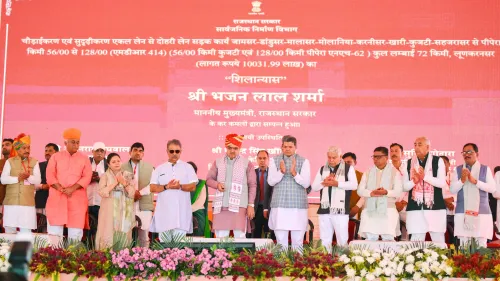Is the Long-Term Outlook for FPI Flows into India Positive?

Synopsis
Key Takeaways
- Long-term outlook for FPI flows into India is positive.
- Corporate earnings need to align with market valuations.
- India is positioned as a key connector in various sectors.
- Resilience shown by domestic investors supports market stability.
- Global economic challenges are being navigated with confidence.
New Delhi, May 24 (NationPress) Although short-term uncertainties may linger due to international political dynamics, analysts have stated that the long-term outlook for foreign portfolio investor (FPI) flows into India is promising. This optimism hinges on corporate earnings meeting current market valuations, which would boost investor confidence and sustain capital inflows, as noted by Saurabh Patwa, Head of Research and Portfolio Manager at Quest Investment Advisors.
Historically, periods of significant FPI sell-offs have often been succeeded by robust rebounds.
Recent weeks have shown early signs of renewed interest, suggesting potential optimism among investors.
“India’s status as one of the fastest-growing major economies is a key draw for global investors,” he remarked.
The Reserve Bank of India (RBI) indicates that amidst global trade realignments and shifts in industrial policies, India is increasingly set to act as a 'connector country', becoming a vital intermediary in sectors like technology, digital services, and pharmaceuticals.
According to projections by the IMF, India is on track to remain the fastest-growing major economy and is expected to surpass Japan this year, claiming the title of the world’s fourth-largest economy.
Market experts assert that despite significant outflows from Foreign Institutional Investors (FIIs) in recent days, the Indian market has displayed resilience, bolstered by strong buying from domestic institutional investors (DIIs) and retail participants, reflecting unwavering confidence in India’s long-term growth potential.
In recent quarters, FPI flows into India have experienced considerable outflows, primarily due to weak corporate earnings and a slowdown in urban consumption.
These domestic issues have been exacerbated by global challenges, including concerns about an economic slowdown attributed to potential policy changes, such as tariffs from the Trump administration, which have impacted global currencies and bond markets and delayed decision-making by major international corporations.
Looking ahead, despite daunting challenges on the horizon, India is well-positioned to navigate the current global headwinds with assurance, ready to seize emerging opportunities and solidify its role as a crucial driver of global growth, as emphasized by the RBI in its latest bulletin.










